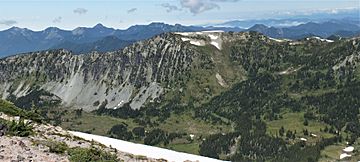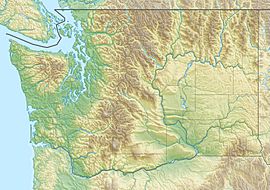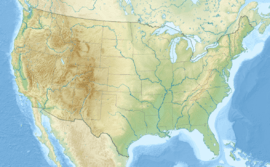Crescent Mountain (Washington) facts for kids
Quick facts for kids Crescent Mountain |
|
|---|---|

South aspect, from Old Desolate
|
|
| Highest point | |
| Elevation | 6,715 ft (2,047 m) |
| Prominence | 275 ft (84 m) |
| Isolation | 0.85 mi (1.37 km) |
| Parent peak | Sluiskin Mountain (7,026 ft) |
| Geography | |
| Location | Mount Rainier National Park Pierce County, Washington, U.S. |
| Parent range | Cascades |
| Topo map | USGS Mowich Lake |
| Climbing | |
| Easiest route | scrambling |
Crescent Mountain is a cool, ridge-shaped mountain in Mount Rainier National Park. It stands tall at 6,715 feet (2,047 meters) high. You can find it in Pierce County, Washington state. This mountain is part of the big Cascade Range. It is about 6.6 miles (10.6 km) north of Mount Rainier itself. Sluiskin Mountain is a taller neighbor, just 0.85 miles (1.37 km) to the east. Water from Crescent Mountain flows west into streams that feed the Carbon River.
How Crescent Mountain Got Its Name
This mountain has a special name because of its shape. It looks like a Crescent, which is a curved shape, like a new moon. It curves around a lake called Crescent Lake.
A geologist named Bailey Willis first gave the mountain this descriptive name in 1883. Later, in 1932, the United States Board on Geographic Names officially adopted the name.
Weather at Crescent Mountain
Crescent Mountain is in a place with a "marine west coast" climate. This means it gets a lot of weather from the Pacific Ocean. Most weather systems travel from the ocean toward the Cascade Range.
When these weather systems hit the tall Cascade Mountains, they are forced to rise. As they go higher, the air cools down. This causes the moisture in the air to turn into rain or snow. Because of this, the western side of the Cascades gets a lot of precipitation, especially snow in winter.
During winter, it's often cloudy. But in summer, high-pressure systems over the Pacific Ocean usually bring clear skies. The best time to visit or climb Crescent Mountain is from July through September. The weather is usually sunny and clear then.
 | Madam C. J. Walker |
 | Janet Emerson Bashen |
 | Annie Turnbo Malone |
 | Maggie L. Walker |



